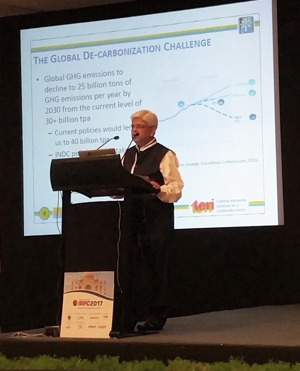IRPC '17: Director examines electrification's role in decarbonization challenge
By Adrienne Blume, Executive Editor
NEW DELHI, INDIA—The second day of IRPC 2017 opened with a keynote by A. K. Saxena, Director of the Electricity and Fuels Division at The Energy and Resources Institute (TERI).

Mr. Saxena stressed that climate change is driving energy transitions. The COP 21 treaty (also known as the Paris Climate Change Conference) demands that all participating countries take action to limit the global temperature rise to less than 2°C by the end of the century.
Decarbonization challenge for global industry. The COP 21 initiative presents a global decarbonization challenge for the hydrocarbon processing industry, Mr. Saxena explained. Global energy consumption is set to increase by at least 30 B tons of oil equivalent per year (toe/yr) from the present level of 14 B toe/yr.
"No country has been able to achieve a high quality of life with energy consumption of less than 2 toe/yr per person," he noted. The minimum consumption level among OECD countries is 4 toe/yr per capita.
Amid global megatrends, such as rising and diversifying energy consumption, population growth, economic development, growing urbanization and expanding demand for personal transport, "We have to move to low emissions and high energy per capita," Mr. Saxena said.
The Director named a key set of interventions that may assist in reaching these goals:
- Reduce global energy intensity to 3%/yr from the present rate of 1.5%/yr
- Enhance the share of renewable energies in the electricity mix
- Enable electrification wherever possible in applications where fossil fuels are used, such as road transport
- Invest in technologies, such as biofuels and carbon capture and sequestration, which can help decarbonize sectors where electrification is not possible.
Indian efforts to reduce carbon intensity. Mr. Saxena noted that decarbonization efforts in India will be assisted by CNG and biofuels substitution, as well as a targeted vehicle fuel efficiency increase of 1%/yr over the next 15 yr.
If the Indian electricity grid is able to absorb high amounts of renewable energies, the Director said, then it may culminate in a future where the domestic electricity sector relies heavily on renewable electricity, with limited reliance on fossil fuels.
In closing, Mr. Saxena left attendees with three key questions to consider:
- How do oil and gas maintain their attractiveness as fuels of choice in a paradigm of altered energy considerations and needs?
- What technological interventions or innovations would be required to sustain their future?
- What part can oil and gas companies play in the impending clean energy revolution?
IRPC 2017 is taking place at the Taj Palace in New Delhi from April 18–20.







Comments